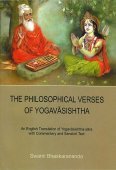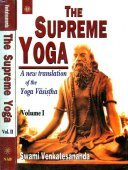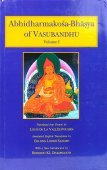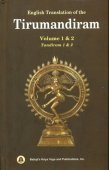Contemplation: 1 definition
Introduction:
Contemplation means something in Hinduism, Sanskrit. If you want to know the exact meaning, history, etymology or English translation of this term then check out the descriptions on this page. Add your comment or reference to a book if you want to contribute to this summary article.
In Hinduism
Yoga (school of philosophy)
Source: ORA: Amanaska (king of all yogas): A Critical Edition and Annotated Translation by Jason BirchContemplations (of various sort) are denoted by the Sanskrit term Vicāra, according to the Yogabīja 80.—Accordingly, while discussing the connection between mind and breath: “The mind cannot be subdued by contemplations (vicāra) of various sorts. Therefore, the breath alone is the means to the conquest of it. There is no other way”.

Yoga is originally considered a branch of Hindu philosophy (astika), but both ancient and modern Yoga combine the physical, mental and spiritual. Yoga teaches various physical techniques also known as āsanas (postures), used for various purposes (eg., meditation, contemplation, relaxation).
See also (Relevant definitions)
Ends with: Dissolution Contemplation, Misery Contemplation, Reflecting Contemplation.
Full-text (+745): Samadhi, Samadhistha, Nididhyasa, Dhyana, Anudhyasa, Yoga, Brahmanishtha, Adhyatmarati, Pranidhana, Yogamaya, Abhimukha, Jivanmukta, Anupreksha, Nasagra, Samayika, Vicara, Pravarttana, Anupashyana, Satyavrata, Sadhya.
Relevant text
Search found 268 books and stories containing Contemplation; (plurals include: Contemplations). You can also click to the full overview containing English textual excerpts. Below are direct links for the most relevant articles:
Visuddhimagga (the pah of purification) (by Ñāṇamoli Bhikkhu)
The Eighteen Principal Insights < [Chapter XX - Purification by Knowledge and Vision of the Path and the Not-path]
The Triple Gateway to Liberation < [Chapter XXI - Purification by Knowledge and Vision of the Way]
Insight (5): Knowledge of Dispassion < [Chapter XXI - Purification by Knowledge and Vision of the Way]
Brahma Sutras (Shankaracharya) (by George Thibaut)
IV, 1, 5 < [Fourth Adhyāya, First Pāda]
IV, 1, 6 < [Fourth Adhyāya, First Pāda]
IV, 1, 3 < [Fourth Adhyāya, First Pāda]
Taittiriya Upanishad (by A. Mahadeva Sastri)
Chapter III - Some Minor Contemplations < [Book III - Bhriguvalli]
Lesson III - Contemplation of Saṃhitā < [Book I - Shiksha Valli]
Lesson V - Contemplation of the Vyāhṛtis < [Book I - Shiksha Valli]
The Book of Protection (by Piyadassi Thera)
Discourse 15 - Discourse To Girimananda Thera < [Discourses]
Discourse 23 - Discourse On The Analysis Of The Truths < [Discourses]
Discourse 24 - Discourse On Atanatiya < [Discourses]
Maha Prajnaparamita Sastra (by Gelongma Karma Migme Chödrön)
Part 3 - The twelve causes and conditions are profound < [Chapter I - Explanation of Arguments]
Part 5-6 - Description of sarvākāra (all aspects) and sarvadharma (all dharmas) < [Chapter XVI - The Story of Śāriputra]
Part 2 - The true nature, the nature of phenomena and the summit of existence < [Chapter I - Explanation of Arguments]
The Catu-Bhanavara-Pali (critical study) (by Moumita Dutta Banik)
(4) Girimananda Sutta < [Chapter 3 - Subject Matter of the Second Bhanavara]
The second Bhanavara (Introduction) < [Chapter 3 - Subject Matter of the Second Bhanavara]
(7) Sacca-vibhanga-sutta < [Chapter 4 - Subject Matter of the Third Bhanavara]
Related products





